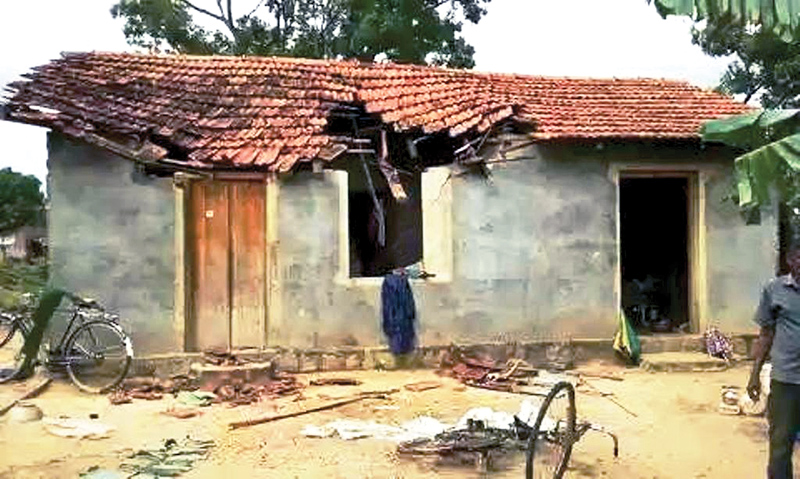
jumbo solution needed for EP human-elephant conflict
Minister of Sustainable Development and Wildlife Gamini Jayawickrama Perera has received Cabinet approval in March to set up Wildlife Administration Units in areas where the conflict was rampant. This was to allow officials to take immediate action when such incidents are reported. In July, Cabinet further granted approval
to set up five more units to review their progress, so that they could be replicated around the country. This was a short term measure to resolve the conflict
Sixty-year-old Athamlebbe Abdul Gaffoor was riding his bicycle on the way to his paddy field in Illukuchenai, Ampara in the morning when an elephant attacked him, trampling him to death.
A father of five from the Addalaichenai, Division No. 9, Meenodaikaddu area, he was only one of the many victims of the human-elephant conflict in the Eastern Province.
Villagers of Ampara, Batticaloa and Trincomalee districts complain that wild elephant attacks in recent times have intensified and that the elephants are braving their way further into these villages in search of food and water.
The people have also resorted to setting fire to forests in the area to keep elephants away causing environmental harm.
“Earlier these elephants used to enter our villages only during the night. But now they are entering our villagers even during the day,” said Mohamed Abbas.
Abbas explained that the villagers live in fear and at times, many leave the villages at night to sleep elsewhere.
“Most of our time is spent chasing these wild elephants from our areas or our fields. The men keep watch at night while the women take on that role in the daytime. Because of this, we have very little time to improve our livelihoods,” he said.
The Eastern Province has the most profitable paddy cultivation in the island but many farmers have suffered losses over the years because of the wild elephants’ rampage. Even they invade their home gardens causing great losses to many households.
Their children have to sit for the O/L exam in this December but they fear that they would not be able to acquire sufficient knowledge of the subjects as a wild elephant often interrupt their studies by entering their school compound.
“Our children cannot study. When they are studying, wild elephants come in. We are all under severe stress,” said 35-year-old Fathima Rauff.
The villagers claimed that the Eastern Province authorities neglect their pleas and not to take steps to resolve the issue.
Every year about 50-60 people and 200 elephants die as a result of the human-elephant conflict, they claim.
However, Minister, Sustainable Development and Wildlife Gamini Jayawickrama Perera has received Cabinet approval in March to set up Wildlife Administration Units in areas where the conflict was rampant. This was to allow officials to take immediate action when such incidents are reported. In July, Cabinet granted approval to set up five more units to review their progress, so that they could be replicated around the country. This was a short term measure to resolve the conflict.
In addition, Cabinet in October granted approval to erect 800km of electric fence around villages with elephant threats. Around 3,300 km of electric fence has already been erected in areas where the conflict causes severe damages. In this year alone, the government has built 275 km of fence and in 2017 it plans to add 800km of fence in seven wildlife zones. However, who would be in charge of monitoring these fences and to ensure that they work as planned is yet to be decided. The fences have to continuously monitored and repaired since elephants do break them from time to time.
At a recent Ampara District Secretariat meeting, it was proposed to erect electric fences.They have even announced the decision to the villagers.
The villagers have also requested to extend the fences to the interior of villages since the elephants have now made it a habit to enter further inwards.
The human-elephant conflict make havoc in the East. A farmer traveling to his paddy field at around 5.30 am was trampled to death by an elephant at the 4th mile post along the Ampara- Akkaraipattu road in the Akkaraipattu DS division.
A wild elephant attached a teacher from Sammanthurai area when she was on her way to school.
Ibralebbe Kamarudeen (69), was rushed to the Oluvil district hospital having suffered an elephant attack when he was going to the Jummah mosque in Ashraff Nagar to attend Friday prayers.
Katheeja Ummah (52) was attacked by an elephant while at home in Ashraff Nagar, a re-settlement village in the Addalaichenai DS division. She was admitted to the Akkaraipattu Base Hospital with serious injuries.
These ‘every day’ attacks beg the question of compensation. With unplanned development worsening the conflict by the day, naturally the people demand compensation from the government for their losses. The compensation however does not often reach them or when it does, it comes very late.
In September, Cabinet granted approval to amend the compensation payment for damages caused by wild elephants. As of September 2016, the total compensation payment made was about Rs. 25-35 million.
However, Cabinet approval was granted to increase the compensation for deaths and permanent disabilities (irrespective of victims’ age) caused by wild elephant attack to Rs. 200,000 – Rs. 75,000 for physical injuries and Rs. 100,000 for house and property damages.
A committee chaired by the District Secretary receive the payments to prevent delays in payment. Moreover, a Committee of Appeal chaired by the Director General of Wildlife will consider the appeals of those who are not satisfied with the decisions taken by the former committee.
However, the villagers are yet to witness the efficiency of these committees in awarding compensation to the victims of the conflict..
Source : 21/11/2016 Daily news http://www.dailynews.lk/2016/11/21/features/99637







